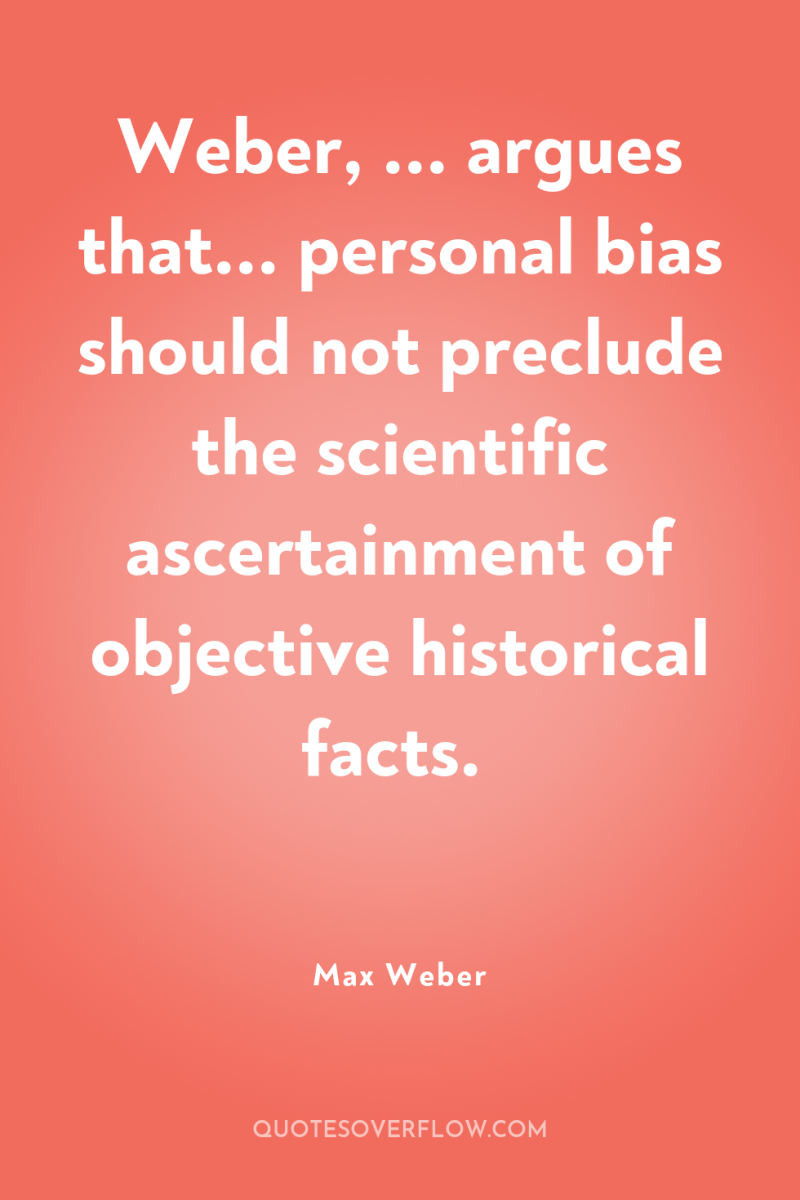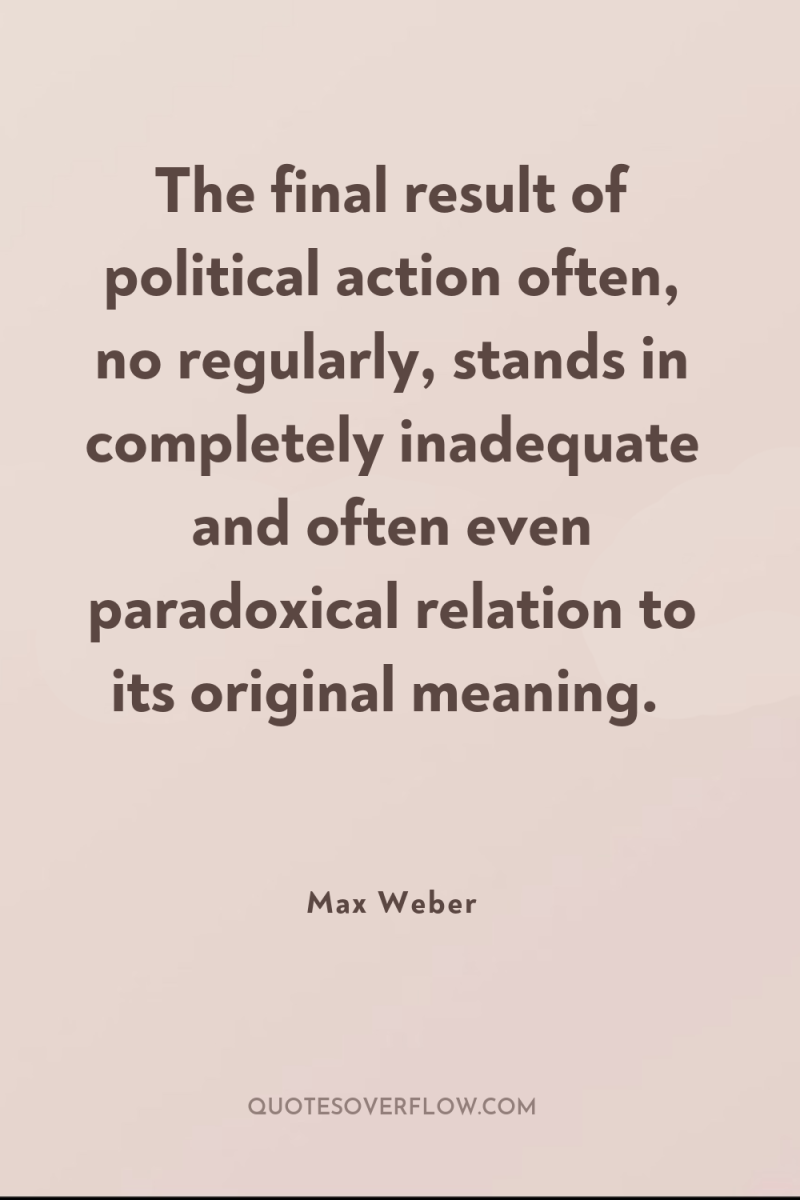1
The intellect, like all cultural values, has created an aristocracy based on the possession of rational culture and independent of all personal ethical qualities of man. The aristocracy of intellect is hence an unbrotherly aristocracy.Max Weber

2
Weber, ... argues that... personal bias should not preclude the scientific ascertainment of objective historical facts.Max Weber
3
Tolstoi has given the simplest answer, with the words: ‘Science is meaningless because it gives no answer to our question, the only question important for us: "What shall we do and how shall we live?"' That science does not give an answer to this is indisputable. The only question that remains is the sense in which science gives ‘no’ answer, and whether or not science might yet be of use to the one who puts the question correctly.Max Weber
4
Politics is a strong and slow boring of hard boards. It takes both passion and perspective. Certainly all historical experience confirms the truth - that man would not have attained the possible unless time and again he had reached out for the impossible. But to do that a man must be a leader, and not only a leader but a hero as well, in a very sober sense of the word. And even those who are neither leaders nor heroes must arm themselves with that steadfastness of heart which can brave even the crumbling of all hopes. This is necessary right now, or else men will not be able to attain even that which is possible today.Max Weber

5
The final result of political action often, no regularly, stands in completely inadequate and often even paradoxical relation to its original meaning.Max Weber
6
It is certain that there can be no work in political economy on any other than an altruistic basis... If our work is to retain any meaning it can only be informed by this: concern for the future, for those who will come after us.Max Weber
7
As intellectualism suppresses belief in magic, the world's processes become disenchanted, lose the magical significance, and henceforth simply 'are' and 'happen' but no longer signify anything.Max Weber
8
... A state is a human community that (successfully) claims the monopolyof the legitimate use of physical force within a given territory.Max Weber
9
Rational conduct on the basis of the idea of calling, was born... from the spirit of Christian asceticism.Max Weber
10
Bureaucracy develops the more perfectly, the more it is 'dehumanized', the more completely it succeeds in eliminating from business love, hatred, and all purely personal, irrational, and emotional elements which escape calculation.Max Weber
11
...Material goods have gained an increasing and finally inexorable power over the lives of men as at no previous period in history.Max Weber
12
In a democracy the people choose a leader in whom they trust. Then the chosen leader says, 'Now shut up and obey me.' People and party are then no longer free to interfere in his business.Max Weber
13
.. It is immensely moving when a mature man - no matter whether old or young in years - is aware of a responsibility with heart and soul. He then acts by following an ethic of responsibility and somewhere reaches the point where he says: 'Here I stand; I can do no other'. That is something genuinely human and moving. And every one of us who is not spiritually dead must realize the possibility of finding himself at some time in that position. In so far as this is true, an ethic of ultimate ends and an ethic of responsibility are not absolute contrasts but rather supplements, which only in unison constitute a genuine man - a man who can have the 'calling for politics'.Max Weber
14
In the midst of a culture that is rationally organized for a vocational workaday life, there is hardly any room for the cultivation of acosmic brotherliness, unless it is among strata who are economically carefree. Under the technical and social conditions of rational culture, an imitation of the life of Buddha, Jesus, or Francis seems condemned to failure for purely external reasons.Max Weber
15
... Whenever the man of science introduces his personal value judgment, a full understanding of the facts ceases.Max Weber
16
The primary task of a useful teacher is to teach his students to recognize 'inconvenient' facts - I mean facts that are inconvenient for their party opinions.Max Weber
17
No sociologist should think himself too good, even in his old age, to make tens of thousands of quite trivial computations in his head and perhaps for months at a time.Max Weber
18
It is not true that good can only follow from good and evil only from evil, but that often the opposite is true.Max Weber
19
The so-called 'materialistic conception of history, ' with the crude elements of genius of the early form which appeared, for instance, in the 'Communist Manifesto, ' still prevails only in the minds of laymen and dilettantes.Max Weber
20
Power is the chance to impose your will within a social context, even when opposed and regardless of the integrity of that chance.Max Weber
21
Politics means striving to share power or striving to influence the distribution of power, either among states or among groups within a state.Max Weber
22
Precision, speed, unambiguity, knowledge of files, continuity, discretion, unity, strict subordination, reduction of friction and of material and personal costs - these are raised to the optimum point in the strictly bureaucratic administration.Max Weber
23
All knowledge of cultural reality, as may be seen, is always knowledge from particular points of view.Max Weber
24
The career of politics grants a feeling of power. The knowledge of influencing men, of participating in power over them, and above all, the feeling of holding in one's hands a nerve fiber of historically important events can elevate the professional politician above everyday routine even when he is placed in formally modest positions.Max Weber
25
Certainly all historical experience confirms the truth - that man would not have attained the possible unless time and again he had reached out for the impossible.Max Weber
26
Either one lives 'for' politics or one lives 'off' politics.Max Weber
27
Politics is a strong and slow boring of hard boards.Max Weber